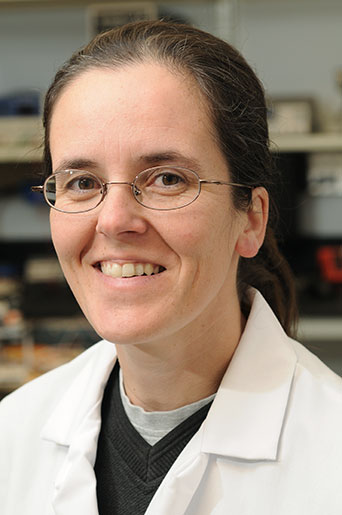Research Benefits from Collaboration
Advancements in medicine require advances in healthcare infrastructure. Our Systems Engineering and Operations Research Department produces engineers who can plan, design, implement and manage complex systems that are safe, secure, and reliable. Further, breakthrough methods in Data Analytics and Statistics provide answers to complicated health questions faster and better than traditional computations.
Health care tech opportunities in the CEC's Electrical and Computer Engineering and Bioengineering departments involve the creation of medical technologies such as robotic surgical tools, running on, and potentially sourcing patient data from, software generated by the expertise in our Computer Science Department.
Our research areas include:
|
|
|
|
|
|
|
|
|
|
Attacking tumors from the inside
Cancer treatments often involve applying drugs or therapies from outside the body, but George Mason University bioengineering professor Nitin Agrawal is working on a method to treat tumors internally.
Agrawal received a $300,000 grant from the National Science Foundation to develop an anti-cancer therapy in which researchers will induce the body to grow more T-cells. Cytotoxic T-cells are white blood cells that are involved in recognizing and responding to foreign or abnormal cells.
"We are trying to make an army of these white blood cells without taking them out of the body," Agrawal said.
To do this, the researchers use liposomes, or small packets of lipids—molecules that don't readily mix with water—that can hold a desired treatment. They plan to fill those packets with the materials necessary for cell growth.
The researchers also include on the liposomes a molecule, protein or antibody that seeks out the T-cells the scientists want to expand.
Once the packets go into the bloodstream, they selectively and specifically bind only to the T-cells the researchers want to multiply. Once attached, the liposomes slowly release the encapsulated drug inside them.
Agrawal has been working on this project for a year, but the concept of using the body's own immune system to kill cancer cells has been around since the 1990s.
The liposomes offer two key benefits—they prevent unnecessary contact between the drugs and unaffected cells, and they allow the drugs, which would otherwise have a very short half-life, to remain stable within the body. Currently, this type of therapy only works effectively on melanoma—a sometimes deadly form of skin cancer—but Agrawal hopes it will one day be a treatment option for solid tumors.
Agrawal said his grant money is being used to fund the student researchers working with him and the materials they are using. He said the current project will include in vitro studies using cultured cells and, depending on the results of those studies, animal trials and human tests would follow.
Rohan Fernandes, a researcher with Children's National Health System who is familiar with Agrawal's work, said this research could ultimately have far-reaching effects.
"The principles explored in this project will likely have implications in not only treating cancers, but potentially infectious diseases, as well, by applying this [particular] targeting and activation platform to other cell types of the immune system," Fernandes said.
Researcher Profile: Nathalia Peixoto, Bioengineering
Nathalia Peixoto joined the research and teaching faculty at the College of Engineering and Computing – Bioengineering Department in 2006. Previously, she was a postdoctoral researcher at the Krasnow Institute, focusing on seizure control with low-frequency electric fields
She also developed micro-fabricated oxygen sensors to profile metabolic activity in cardiac cells at Stanford University. During her PhD at Universidade de São Paulo, Brazil, Peixoto developed microelectrode arrays and investigated primary neuronal cultures. As part of her PhD project, she spent almost two years in Bonn, Germany, as a researcher with the German Retina Implant project.
Peixoto’s research interests include implantable electrodes and systems, hybrid systems (cell cultures and electronics), control of assistive technology, bioMEMS (bio-micro-electro-mechanical systems), and experimental models of neuro-pathologies such as epilepsy and spreading depression.
She teaches such classes as Neural Engineering and Computational Neurobiology.
Departments Active in Healthcare Research
Bioengineering
The Department of Bioengineering has close collaborations with national laboratories and medical facilities in the Washington DC metropolitan area, including the National Institutes of Health Clinical Center, (NIH), Walter Reed National Military Medical Center, US Naval Research Laboratory (NRL), Children’s National Medical Center (CNMC), Food and Drug Administration (FDA), and INOVA hospitals. Through the efforts of our faculty and students, we seek to achieve national recognition in bioengineering research and education.
Computer Science
Researchers in the Department of Computer Science design, implement, and maintain computer software systems used in almost all other professions. Students majoring in computer science will become well grounded in technologies needed for the acquisition, representation, storage, transmission, transformation, and use of information in digital form and must be capable of working closely with members of other professions associated with computing.
Electrical and Computer Engineering
Researchers in the Electrical and Computer Engineering Department work on the foundations on which computer engineering and computer science rest. Electrical engineers design and build the equipment that most of us take for granted—computers, cell phones, televisions, rockets, satellites, communications and computer networks, mobile radios, environmental control systems, robots, weapons, and medical devices. With a proud history as one of the school’s founding departments, ECE also the distinction of being closely allied with the recently established Department of Bioengineering.
Statistics
The Department of Statistics conducts fundamental research and guides students in developing the knowledge, skills, and experience needed to model, analyze, and understand real-world data arising in science, medicine, and social sciences.The department has expertise in many cutting-edge areas of statistical research, including biostatistics, the application of statistics to medical research; biometric identification; and computational statistics, including visualization and data mining.
Systems Engineering and Operations Research
The Department of Systems Engineering and Operations Research prepares students to determine the most effective ways for an organization to use all of a given system's components -- people, machines, materials, information, and energy. Operations researchers try to find order in apparent chaos by identifying the structure in complex situations and understanding how the components or organizations interact. Operations research provides a rational basis for making decisions.


